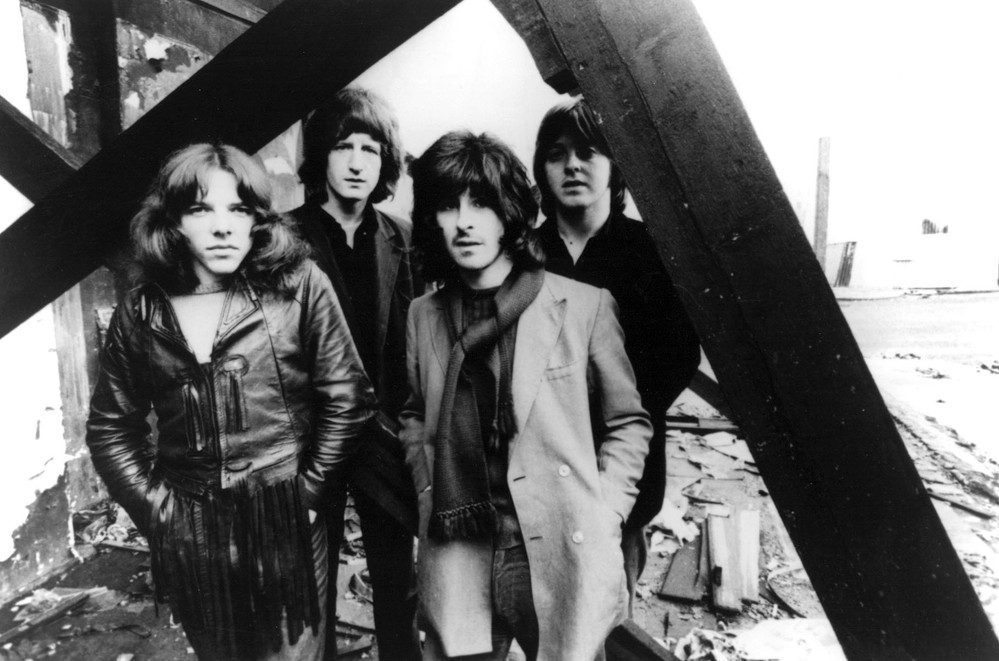
The Iveys’s first single from the soundtrack album Magic Christian Music was scheduled for release during the first week of December 1969, except the band now needed a new bass player. There was also a bit of other business to discuss. In the seminal and unauthorized 2022 biography of the band, Without You: The Tragic Story of Badfinger, Dan Matovina writes that sometime after signing their new deal with Apple Records, the Welsh group had been encouraged by the label to change their name. Iveys guitarist-singer Tom Evans admitted, “We were told many times that The Iveys was a stupid name.” Several substitutions were proposed, none meeting with universal approval by the band members. Among the suggested monikers: The Glass Onion, Fresh, Tendergreen. Lennon sarcastically offered the name “Prix”, pronounced as ‘pricks’, while McCartney submitted “Home”.
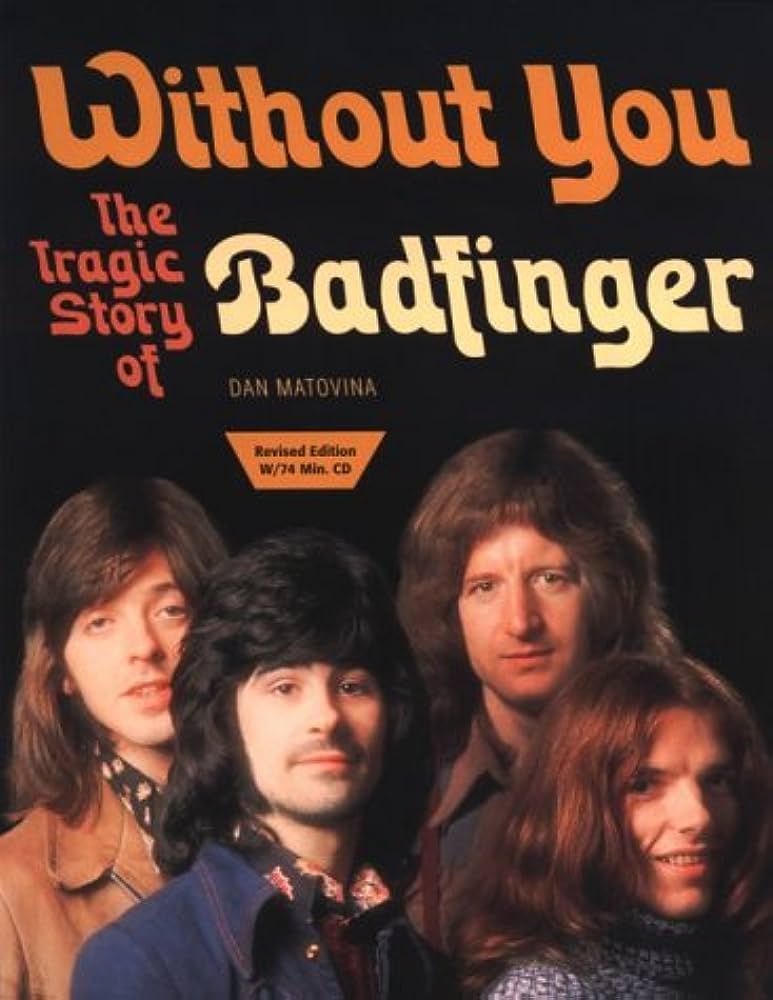
In the end, it was Apple Executive Producer Neil Aspinall who found it. Hanging out one night with Iveys Manager Bill Collins at a pub, Aspinall brought up “Bad Finger Boogie”, the original working title John Lennon attributed to the song that eventually became “With a Little Help From My Friends.” Collins took the phrase to the group. They all liked it, immediately adopting the new name Badfinger. Vocalist/guitarist Pete Ham, drummer Mike Gibbins, and guitarist Evans were no longer The Iveys. Thus, Magic Christian Music now became the group’s second album as a band on Apple Records, but their first as Badfinger.
Except they still hadn’t found a new bass player. After being dissatisfied with the search for an adequate replacement for Ron Griffiths (qualified bassists around Swansea or Liverpool were reputedly sparse), Tom came up with a brilliant strategy: He was willing to switch from the role of guitarist to that of bassist, thus allowing a much easier search for the larger number of guitarists available to choose from. The search was soon over, and their new guitarist—Joey Molland from Liverpool—joined the Apple Records family.
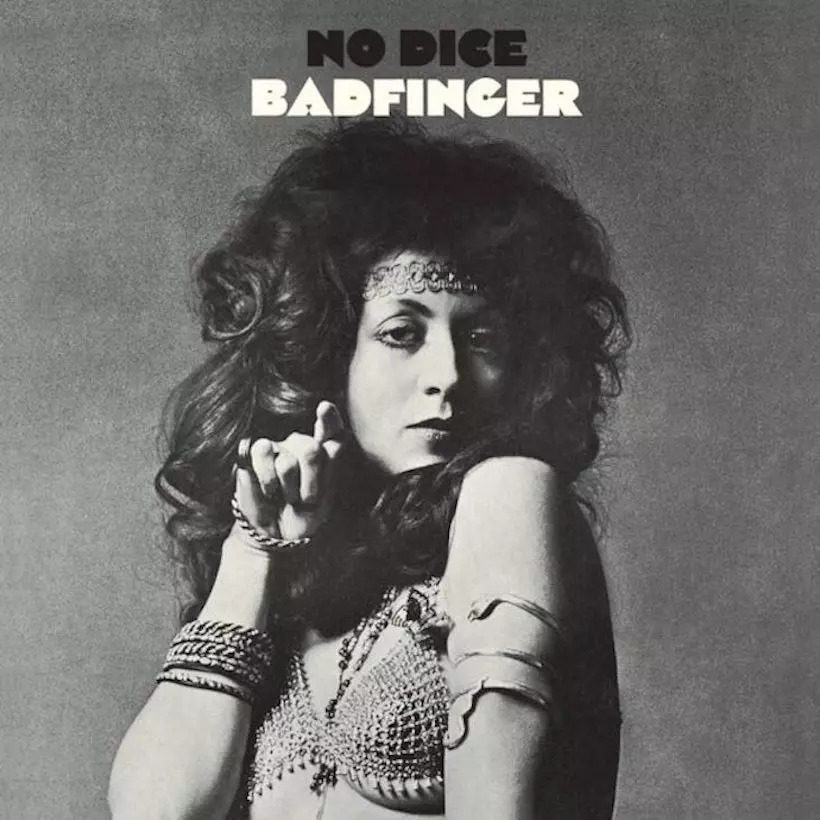
Comprised of fourteen tunes, Magic Christian Music contained a blend of the new songs the band had written for the soundtrack supplemented by previous songs that were reworked from the shelved Iveys material (The US version had twelve songs—“Give It A Try” and “Angelique” were dropped.) There was also the song McCartney wrote for the album, which he persuaded the band to perform as is, without changing any part of the arrangement. Paul said to them, “No one will know anyway, and even if they do say anything, say, ‘Yes, Paul did the arrangement, big deal, it’s not unheard of.’” Indeed, the strategy worked to perfection, and the tune became Badfinger’s first smash hit. But the band’s smooth sailing at Apple was headed for treacherous waters when the Beatles officially announced their breakup on April 10, 1970, and newspaper headlines around the world shouted their demise.
By the summer of 1970, Badfinger began work on their second official album, No Dice, which featured a catchy single, “No Matter What.” The tune sounded so much like the now-defunct Beatles that, to no one’s surprise, it earned Badfinger the reputation as the collective heir apparent to the Apple dynasty. After the album broke into the Top 30, they did a three-month tour of the US that lasted from October through December, 1970. By December, “No Matter What” became the group’s second Top 10 single. Everyone—including the Beatles themselves—believed Badfinger would be the next big thing.
Consider this: Paul had led the charge by giving the band his song “If You Want It”, which became a hit. Ringo then allowed Badfinger to appear on the soundtrack for Magic Christian Music. In the spring of ’71, Lennon invited them to play on his Imagine album (they played on “Jealous Guy” and “I Don’t Wanna Be a Soldier, Mama”), while Harrison enlisted their contributions on All Things Must Pass. Ham and Tom were also invited to sing background vocals—with Mal Evans on tambourine—on Ringo Starr’s new single, “It Don’t Come Easy”, a song allegedly written, according to author Robert Rodriguez, by Harrison but credited to Ringo.
Because Badfinger’s success came so suddenly, work on a follow-up album was quickly green-lighted. McCartney, however, was now shifting his energy and attention to his own secret solo album, titled McCartney, and was losing interest in working on the Badfinger project. The same had happened with another Apple artist—Mary Hopkin, whose first single, “Those Were The Days”, started as a McCartney production, but was then handed off to studio engineer Geoff Emerick to be completed.
When it came Badfinger’s turn to be handed off, Emerick expected he would get the nod. “This time the torch was passed to Mal instead of me,” Emerick said. Although Mal earned his stripes as the one who first connected the Iveys to Apple, Emerick said Mal “had no training in anything other than looking after the Beatles… he didn’t know what to do with his life so he decided to become a talent scout… he hung around in the studios with the Beatles long enough that he thought he knew how to produce records but he really didn’t.”
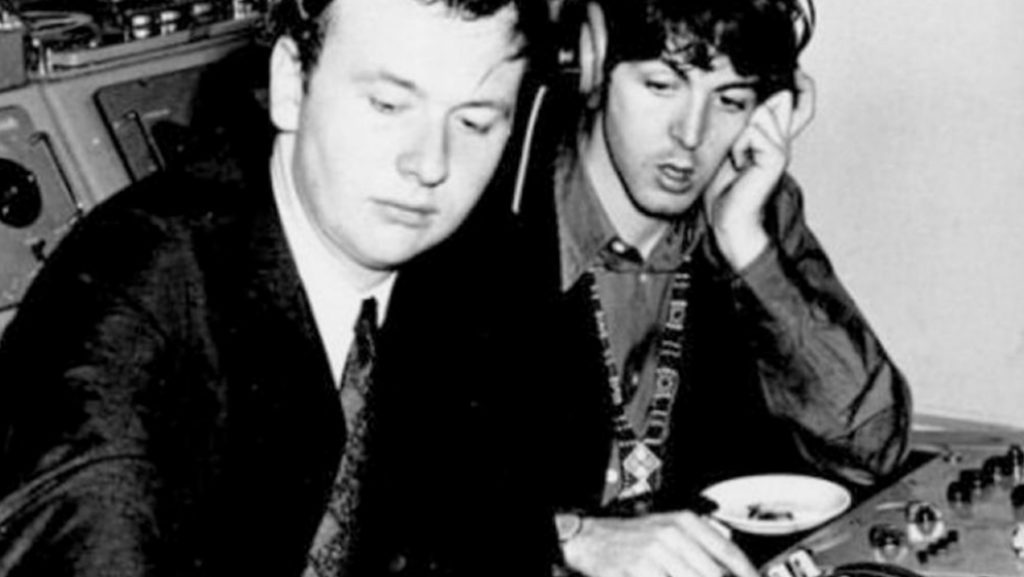
Mal’s lack of musical knowledge and experience undermined his ability to create ideas of substance, which left him exposed to severe criticism. “He was clearly in over his head,” Emerick said. “He just relied on the engineers he was using—Ken Scott and Richard Lush—to do their job.” Emerick also alleged that the newest bandmate, Molland, was as equally “paranoid and manipulative” as Bill Collins, as they collaborated to push Mal out of the picture.
Apple Records boss Allen Klein showed little patience for this unstable situation, and Mal Evans was summarily supplanted by Emerick. “It was a nasty, embarrassing meeting,” Emerick said. “Bill used me to force Mal out.” Emerick felt that Evans was fired unfairly due to Collins’s paranoia in believing he not only wanted to be producer but also in complete managerial control of Badfinger.
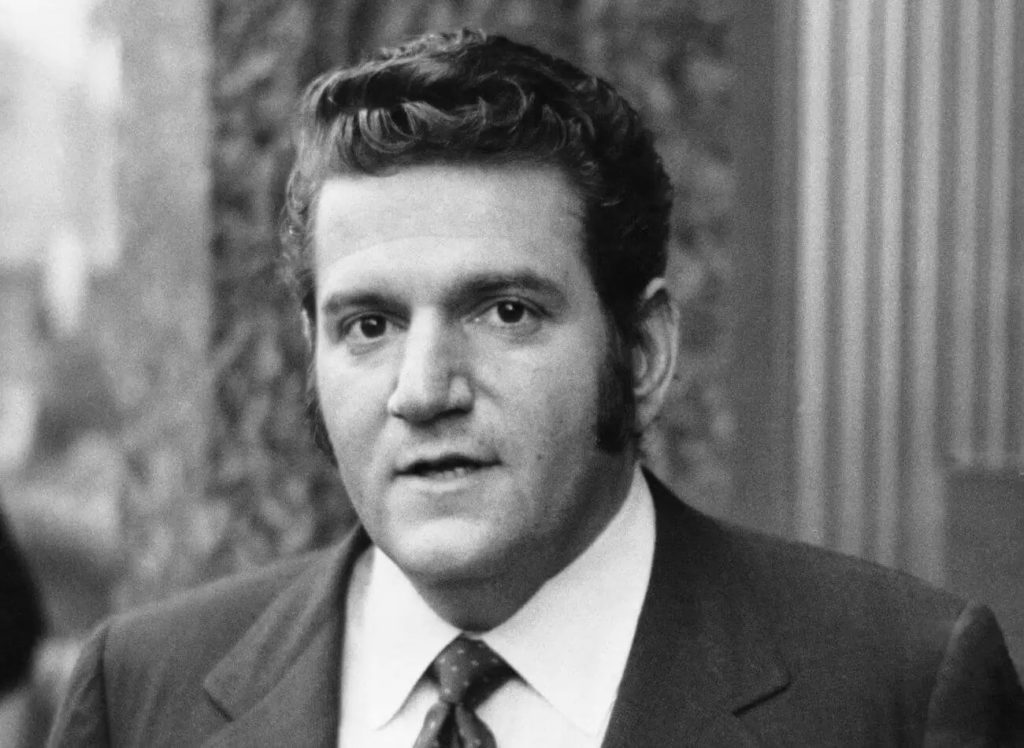
Badfinger’s new album was both falling behind schedule and becoming more expensive, and the label—at Klein’s directive—rejected the initial session tapes, citing inferior product due to the hastily-mixed sound quality. The band members discussed publicly their disdain and disappointment, while the label pushed them to deliver a product that was much closer to the more familiar, sure-fire “Abbey Road” sound that the Beatles had crafted. By the time the band returned from the 1971 US tour in May, they now had a completed-yet-unreleased album of eleven songs sitting on the Apple Records shelf—with no projected release date in sight.
Again, word got out about the group’s disgust with the lack of adequate support from the record company, not to mention the constant comparisons to the Beatles that now carried a negative connotation due to the band’s breakup. Then there was the interview in Rolling Stone magazine the band gave on May 3 (slated for the June 10 issue) that exposed the band’s unilateral gripes about how they all felt neglected and abandoned by the company. Apple Records A&R Manager Allan Steckler was quoted saying, “I really wasn’t thrilled with Geoff’s work. He’s a great engineer, but I didn’t feel he had the ears to hear something commercial.”
Steckler shared his views with Harrison regarding the rapidly deteriorating circumstances surrounding the new album’s fate. “I felt the group didn’t have a real producer,” Steckler said he told Harrison, who agreed to step in and save the album by bringing the band into the studio under his direction. “He said he would find some time to do it,” said Steckler. “And he did.”
Harrison had already been a huge supporter of the band, and even introduced them onstage during their three-night stand at Ungano’s, a popular New York City club, when Badfinger was on their first U.S. tour (a move that gave the band instant credibility in the eyes of the American press). He was now officially serving as producer of Badfinger’s third album, Straight Up (eventually released in December 1971 in the US and February 1972 in the UK.) He oversaw the sessions in Abbey Road’s Studio #2—the same location where he’d recorded some of his own songs for All Things Must Pass. One of the best tunes slated for the album, “Day After Day,” had George delivering a tasty unison slide guitar duet with the band’s vocalist Ham. According to biographer Simon Leng’s 2006 biography, While My Guitar Gently Weeps: The Music of George Harrison, Molland recalled that “Pete and I had done the backing track, and George came in the studio and asked if we’d mind if he played… it took hours, and hours, and hours, to get those two guitars in sync.”
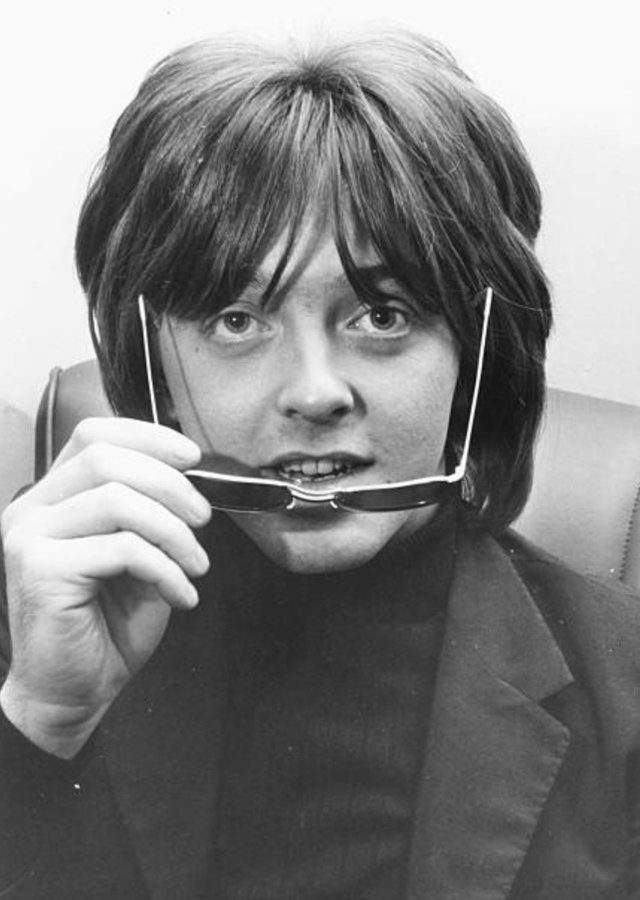
Indeed, when one listens closely to “Day After Day,” its combination of chord progression, melody, and vocal harmony sounds as if it could have been taken straight from the Beatles catalogue, with McCartney singing Ham’s lead vocals. In his biography Without You: The Tragic Story of Badfinger, Matovina references an interview given to Tom Evans and Pete Ham by New York City radio jockeys at the WMCA station, that sums up the general perception at the time: “People said they thought it was Paul McCartney singing it,” said Evans. “Pete’s singing it.”
Harrison was apparently so involved in the band’s progress that, according to some reports, the group felt as if he’d become a fifth member. He’d completed work on four songs—“Name of the Game,” “Suitcase,” “I’d Die Babe,” and “Day After Day”, and had enlisted Leon Russell to play piano on “Day After Day” and guitar on “Suitcase”. Pushing the band’s Beatles connection even further, Molland—the newest bandmember—not only had similar Liverpudlian vocal inflections to McCartney when he spoke, he looked like McCartney! Bill Collins mentioned it in an issue of Music & Echo, saying how the band had a meeting about it and how much it worried them that something that was once considered a compliment had slowly become more of a potential hindrance. Even the reviewers at Melody Maker had wisecracked about the uncanny similarity between both men.
Although Badfinger’s album project and the progress on his own new solo album were Harrison’s main priorities, a much more pressing issue loomed on the horizon. Harrison would face an international crisis the likes of which he’d never witnessed before. This and more in our next installment.
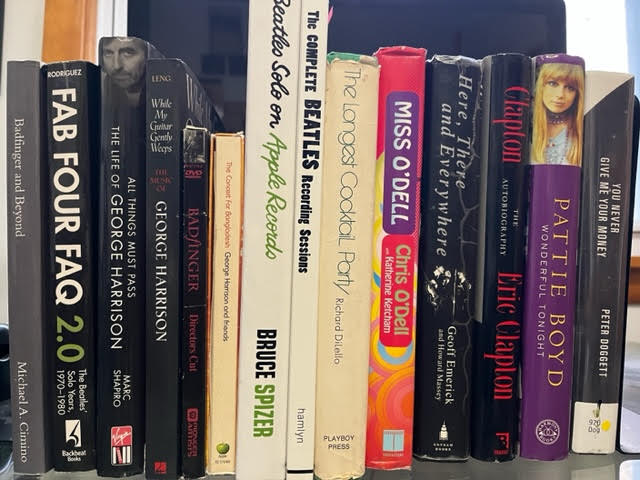
Books and videos on my shelf:
- The Complete Beatles Recording Sessions Mark Lewisohn
- Badfinger: A Riveting and Emotionally Gripping Saga [directors cut DVD] [1997]
- While My Guitar Gently Weeps: The Music of George Harrison by Simon Leng
- Here, There and Everywhere: My Life Recording the Music of The Beatles by Geoff Emerick & Howard Massey [Pioneer Artists]
- Behind The Music: Badfinger [VH1 DVD]
- The Concert for Bangladesh: Gorge Harrison and Friends [Apple Records DVD]
- Without You: The Tragic Story of Badfinger by Dan Matovina
- Badfinger & Beyond: The Biography of Joey Molland by Michael A. Cimino
- Paul McCartney: The Life by Phillip Norman
- The Longest Cocktail Party by Richard DiLello
- Fab Four FAQ 2.0: The Beatles’ Solo Years, 1970-1980 by Robert Rodriguez
- The Beatles Solo on Apple Records by Bruce Spizer















Leave a Reply